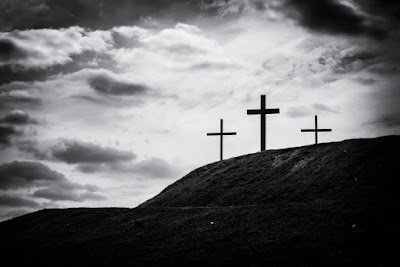Genesis 15: A Deal With God
In Genesis 15 we get to see Abram in all of his humanity. He is far from the Abram in chapter 12 who hears the voice of the Lord and follows without question. Those readings, though a proper representation, do not let us into the mind of the man. They do not tell us about how he might have wrestled with the decision because he had amassed several friends, or how his dad was well along in his years, and it would've crushed Abram to leave him. These things may not have happened, but certainly he had questionings and doubts when the word of the Lord came to him. But those we do not see, we must assume.
- "O Lord God, what will you give me, for I continue childless, and the heir of my house is Eliezer of Damascus?"
- "You have given me no offspring, and so a slave born in my house is to be my heir."
- "O Lord God, how am I to know that I shall possess it?"
These are the wonderings of a normal human being who is simply trying to connect the dots. But in Abram's case there is history behind his wonderings. Perhaps as he hears God's promise of descendants and land he remembers how he and Sarah resigned themselves to not having children. Maybe after years and years and trying they simply said, "Let's face it, weren't meant to be parents." A decision like this, of course, would have been made with much pain and hurt. And as idea of no children settled, it must've left a scar in its place. And now when the voice of the Lord begins speaking about children that scar is ripped wide open as hopes that were forsaken begin entering the mind, and an obviously guarded but hopeful Abram asks, "How can I know?"
"Understanding," says Augustine, "is the reward of faith. Therefore, seek not to understand that you may believe, but believe that you may understand."
While Abram isn't displaying doubts that God's promise would happen, he does exhibit a faith seeking understanding; a faith that wants to become stronger. This type of faith God honors, and in this passage he does so in a way that is so striking that Abram would never forget.
He commands Abram to gather animals, Abram does so and immediately cuts them in half, showing that he knows something of what is to take place. Scholars believe that in Abram's day this was how they made contracts together. In our day, contracts are made on pen and paper; we are a society of the pen (or the computer). In Abram's day they were an oral society; contracts were spoken publicly, and the punishment for breaking them was acted out for all to see. When Abram asks God, "How?" God's answer to Abram was by pointing to himself. Through this treaty with Abram he binds himself to the promise he made to Abram. He is so invested in seeing this promise come to pass that, like the mutilated animals he passes through, he is willing to suffer death if he breaks his word. This is how Abram would know that the promise would come to pass. But if this weren't enough, another message about the character of God is delivered that day. See, in these verbal covenants the acting out of the punishment (passing through the animals to symbolize what would happen if the deal was broken) happened between both parties. So they should've both pass through, but in this passage only God does. This means that he takes upon himself, not only the punishment due if he broke his word, but he takes upon himself the punishment if Abram breaks his part of the covenant. In other words God is saying, "I am so invested in seeing my promise fulfilled in your life that even if you sin, even if you lose faith, even if you break covenant, I will suffer the consequence for you, but I will still bring my promise to pass!" What a deal, right? Yes... for Abram... and for his seed, but not for God! The knowledgeable reader might recall that Abram soon thereafter lost faith, and his descendants lost faith; therefore, if God is going to be true to his word he must suffer death. He must be cut off like the animals he passed through.
And there it is. There is the reason we can trust God unreservedly! The reason Abram learns that God will keep his word is because he sees how fully invested he is in bringing about his promise. This is the same way we can be sure that we can confidently follow Jesus, because we see how committed he was to ensuring the promise of life in the kingdom to any who desire it. If one believes this, then nothing more is needed to move from faith to faith. This is how Abram could "know for certain" that the promise could be realized. This is how we can know, too. And after knowing, we can find life in union with Christ.


